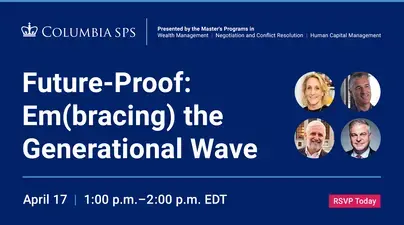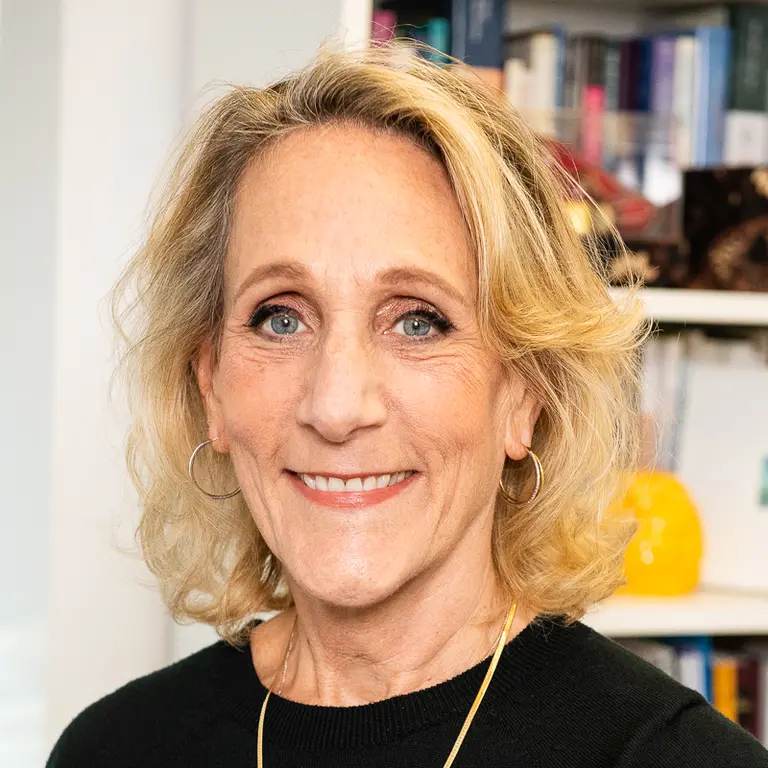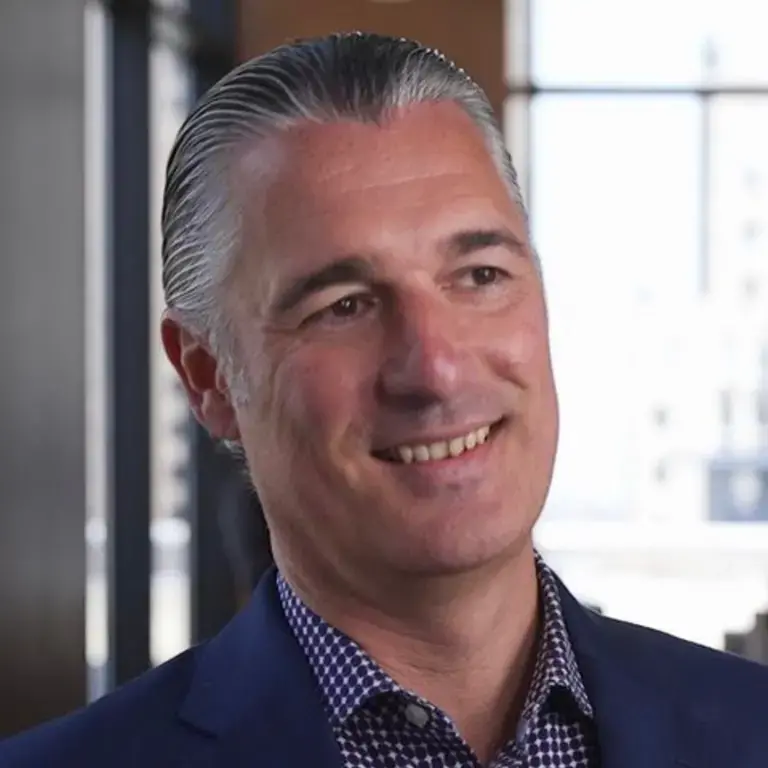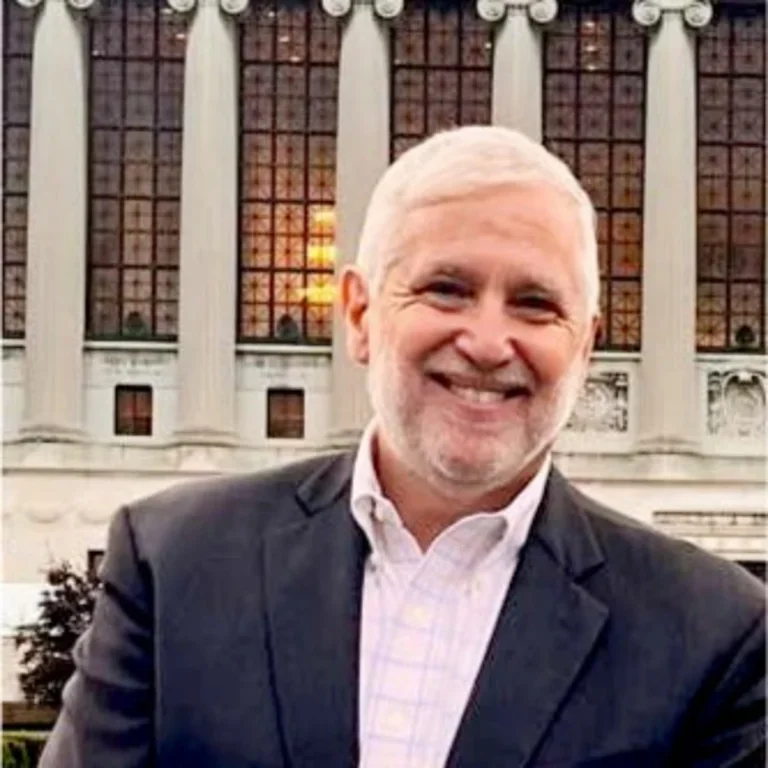Future-Proof: Em(bracing) the Generational Wave

The wealth management industry is at a pivotal impasse, facing the dual challenge of adapting to the preferences and values of a younger consumer generation of wealth. The new demographic of consumers, primarily Millennials and Gen Z, are digital natives who prioritize transparency, sustainability, and personalized services. They demand solutions that align with their values and offer flexibility to actualize their lifestyles. In response, financial services firms must embrace digital transformation, enhance financial literacy, innovate product offerings, and foster a diverse and tech-savvy workforce.
Similar to the transformations witnessed in industries like music and electronics, a consumer revolution may be underway in wealth management, propelling the necessary and ultimate change forward. The industry's ability to adapt to these changes is crucial for its future success and sustainability.
Join Columbia University’s Master of Science in Human Capital Management, Master of Science in Negotiation and Conflict Resolution, and Master of Professional Studies in Wealth Management programs for an interactive panel discussion where program faculty converge to discuss the consumer revolution in financial services/wealth management and explore parallels with other industries and what lessons can be drawn. Attention will be given to the human capital talent required for success which involves adapting skills for the digital era and reshaping leadership paradigms to embrace change and innovation. Moreover, the panelists will address inherent conflicts between traditional and innovative practices, and propose resolution mechanisms. Finally, ethical frameworks in decision-making, especially regarding technology and data usage, will also be emphasized.
Following the conversation, the event will be opened for a question and answer period, where attendees can ask questions directly.
Topics of Discussion Include:
Transformation
- The Consumer Revolution: What defines the consumer revolution in the context of financial services/wealth management, and how is it driven by the preferences of Millennials and Gen Z? Are there learnings/examples from other industries?
- The Business of the Future: What can/should we expect to see in the wealth management industry; what are the changes incumbents need to prepare for; what are the opportunities and risks?
Human Capital Talent
- Adapting Skills for the Future: What competencies will be most valuable for financial professionals in the era of digital transformation and generational wealth transfer?
- Leadership in Transition: How should (must) leadership within financial firms evolve to foster a culture that embraces change, innovation, and adaptability, especially in the context of a potential consumer revolution?
Conflict/Negotiation
- Resolving Inherent Conflicts: As firms evolve to meet the demands of a younger, more digitally inclined consumer base, what mechanisms can be established to address and resolve the conflicts that arise between traditional practices and innovative approaches?
- Ethical Dilemmas and Decision-Making: How can financial services firms establish frameworks for ethical decision-making and conflict resolution in scenarios where technology and data usage may present new ethical dilemmas?
Panelists:
Beth Fisher-Yoshida, PhD – Professor of Professional Practice in Negotiation and Conflict Resolution in the Faculty of Professional Studies; Executive Director, Advanced Consortium on Cooperation, Conflict and Complexity; Program Director, MS Negotiation and Conflict Resolution
Matthias Kuhlmey – Chief Development Officer at Hightower Advisors; Adjunct Lecturer, MPS Wealth Management
Steve Safier, PhD – Lecturer in the Discipline of Human Capital Management in the Faculty of Professional Studies; Program Director, MS Human Capital Management
Moderated by: Philipp Hecker – Chief Executive Officer at Bento Engine; Advisor, MPS Wealth Management
This event is brought to you jointly by Columbia University’s Master of Science in Human Capital Management, Master of Science in Negotiation and Conflict Resolution, and Master of Professional Studies in Wealth Management programs.
Columbia University’s Master of Science in Human Capital Management (HCM) prepares graduates to be world-class HCM strategists, able to address changing needs in building and motivating talented, engaged workforces in the private, public, academic and not-for-profit sectors. Now more than ever, organizations need innovative, business-driving strategies that address human capital challenges through data-driven, market-based insights and organization-wide integrated solutions. HCM graduates are prepared to advance their careers while driving organizational excellence in the new world of work.
Columbia University’s Master of Science in Negotiation and Conflict Resolution (NECR) prepares students to analyze the root causes and dynamics of conflict and to transform disputes through reasoned and resourceful interventions. With courses led by some of the world’s premier scholar-practitioners in negotiation and conflict resolution, the program focuses on developing self-awareness, tenacity, and interpersonal competency; building common ground; opening lines of communication; ensuring representation and recognition; and building sustainable possibilities for resolution.
Columbia University’s Master of Professional Studies in Wealth Management program is uniquely designed to educate working professionals. This 16-month, part-time, online program prepares experienced and aspiring wealth management professionals to meet the disruptive challenges of today’s industry. The innovative and rigorous curriculum connects advanced theory with practical applications through problem-based learning while providing students with the educational requirements for the CFP® certification. For further information, please contact sps-wealthmanagement [[at]] columbia [[dot]] edu.
For additional information about program offerings at Columbia University’s School of Professional Studies, please contact an Admissions Counselor at 212-854-9666 or inquire [[at]] sps [[dot]] columbia [[dot]] edu.



